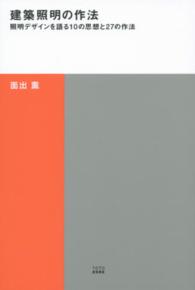Full Description
The Routledge Handbook of Interpreting provides a comprehensive survey of the field of interpreting for a global readership. The handbook includes an introduction and twenty-seven chapters by contributors who are experts involved in the interpreting profession and leading academics in their area.
The four sections cover:
The history and evolution of interpreting;
The core areas of interpreting studies from conference interpreting to transcription, and interpreting in conflict zones to voiceover;
Current issues and debates, from ethics and the role of the interpreter to the impact of globalization;
A look to the future.
Suggestions for further reading are provided with every chapter.
The Routledge Handbook of Interpreting is an essential purchase for advanced undergraduate and postgraduate students of interpreting studies. Professionals working in interpreting or those looking to work in the field will also find this book invaluable.
Contents
Routledge Handbook of Interpreting
Table of Contents
Introduction - Renee Jourdenais & Holly Mikkelson
Part I. Historical Perspectives
The History of the Interpreting Profession: Jesús Baigorri
Key Internal Players in the Development of the Interpreting Profession: Julie Boéri
Key External Players in the Development of the Profession: Sofía García Beyaert
Evolution of Interpreting Research: Franz Pöchhacker
Part II. Modes of Interpreting
Simultaneous Interpreting: Kilian Seeber
Consecutive Interpreting: Kayoko Takeda & Debra Russell
Signed Language Interpreting: Karen Bontempo
Comparing Signed- and Spoken-language Interpreting: Jemina Napier
Sight Translation: Jui-Ching (Wallace) Chen
Transcription and Translation: Carmen Valero-Garcés
Part III. Interpreting Settings
Conference Interpreting: Ebru Diriker
Court Interpreting: Jieun Lee
Interpreting in Asylum Proceedings: Sonja Pöllabauer
Community Interpreting: Marjory Bancroft
Healthcare Interpreting: Cynthia Roat & Ineke Crezee
Interpreting in Mental Health Care: Hanneke Bot
Interpreting in Education: Melissa Smith
Interpreting for the Mass Media: Pedro Castillo
Interpreting in Conflict Zones: Barbara Moser-Mercer
Part IV. Issues and Debates
Ethics and the Role of the Interpreter: Uldis Ozolins
Vicarious Trauma (VT) and Stress Management: Justine Ndongo-Keller
Remote Interpreting: Sabine Braun
Quality: Ángela Collados-Aís & Olalla García Becerra
Assessment: Jean Turner
Pedagogy: Chuanyun Bao
Non-Professional Interpreters: Aída Martínez-Gómez
Interpreting and Professional Identity: Mette Rudvin
Conclusion: Renee Jourdenais & Holly Mikkelson
Index








